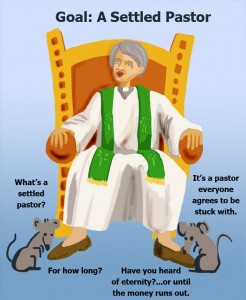Is A “Settled Pastor” A Worthy Goal?
 I grew up in the Church . . . in a preacher’s family. A network of preachers’ families, in fact. Generations of pastors and numerous aunts and uncles representing several denominations working in ministry.
I grew up in the Church . . . in a preacher’s family. A network of preachers’ families, in fact. Generations of pastors and numerous aunts and uncles representing several denominations working in ministry.
It was not until recent years that I heard the term “settled pastor.” But then, fifty years ago, most pastors were settled. It was so much a part of what being a pastor meant that there was no special term.
Perhaps we hear the term today because the Church is hanging on to a relic of the past. These are unsettling times!
What is a “settled pastor”?
A “settled pastor” is a pastor who is called by the congregation with no term limitation. Sometimes it is called a “regularized” call.
It’s not something lay people think about much. They should. The concept can make or break their church and cause lay leaders a lot of heartache. And they won’t see it coming!
There was a time when pastors were assigned to a congregation or called by congregational vote. There they stayed, baptizing, marrying and burying generation after generation of the faithful. A pastor might leave to serve a richer parish or to suit personal goals. The only other reasons to leave were seriously bad behavior or conflict. Poor performance was rarely a reason. Congregations can eke by with a poor, but beloved, pastor for years as resources dwindle.
Redeemer Ambassadors visited one congregation recently that had the same pastor for 18 years. It declined steadily despite the fact that their neighborhood was vibrant. They closed the week after our visit.
They had a “settled pastor” but where did that get them?
The reason the term “settled pastor” is used more frequently is that the concept is becoming rare. Pastors rarely settle into their communities intending to stay for decades—even when they accept calls as “settled pastors.”
Some accept calls to small congregations as stepping stones, proving grounds. Others don’t want a long-term commitment or even a full-time commitment. Their personal lives demand flexibility. Many enter the ministry as second careers and anticipate retiring within a decade or so. They will never be seasoned, full-time pastors. Frequently, they become “interim pastors”—also a new term.
It is probably the growing use of “interim” pastors that the term “settled” has become prevalent. The concept of “interim ministry” is short-term help while congregations consider long-term candidates. Interims terms should be a few months. They are often well over a year—intentionally so. The better to keep the stable of pastors employed.
Consequently, the goal of calling a “settled pastor” is archaic and unfair to congregations who buy into the concept that the pastor they are calling is deeply committed.
The modern congregation is likely to be equally unsettled. Demographics within communities can shift every five years.
So why is the Church pretending that “ssettled pastors” are either the norm or a good idea?
The concept serves another purpose that is rarely stated.
Settled pastors have significant constitutional advantages for clergy and professional leadership. In the Lutheran Church, the settled pastor can leave a congregation at any time with only 30 days notice. However, if a congregation is unhappy, stagnant, achieving none of its goals, declining in giving and attendance and facing a fragile future, they cannot make a leadership change without taking a vote—a two-thirds vote. Usually, twenty percent of an organization plays significant leadership roles. So lay leaders must convince three times their number, from a pool of less committed members, that a change is in the best interest of the congregation.
Having a settled pastor in place, means a problem for the regional body has been solved. A pastor has a job for as long as he or she wants it. Neither the pastor nor the congregation will be knocking on their door for a while!
Church lay leaders must be very careful. Making any kind of demand on a settled pastor can signal war. It won’t be declared as such but lines will be drawn. The settled pastor can easily use his or her position within the congregation and community to subtly rally support. The war will be fought with gossip and innuendo. “Hush! Did you hear ….?”
Lay leaders may be acting with the future of the church in mind, but soon they may be seen as malcontents and troublemakers. “Poor pastor! What he or she has to put up with!”
Their reputations in the community may be strong enough to bear it, but their voice in the church will be filtered.
Congregations will be divided. Conflict may take a serious toll and years to resolve—whether or not the pastor stays.
Perhaps it is time for congregations to insist on term calls as the norm rather than the exception, so that the comfort and security of being a “settled pastor” does not lead a congregation into long-term decline. If a course correction can be made, the existing pastor will have incentive to lead—create and meet benchmarks—and not take their call for granted.
“Unsettled pastors” might be the right servants to lead today’s church.
It’s more work for hierarchy and less secure for clergy.
But then church work is always hard and insecure for the laity.
All welcome.
